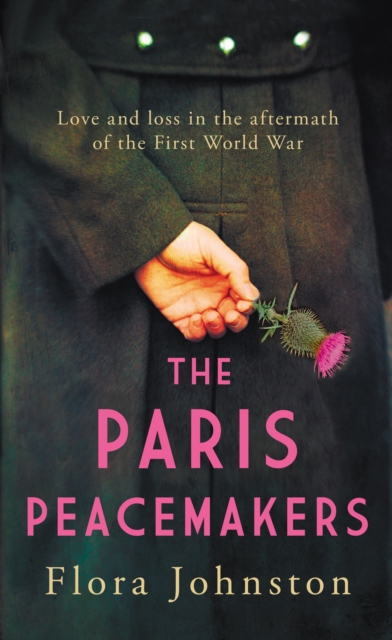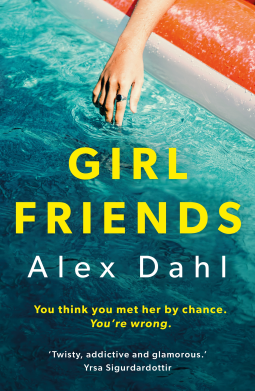
Welcome to today’s stop on the blog tour for The Paris Peacemakers by Flora Johnston. My thanks to Josie at Allison & Busby for inviting me to take part in the tour and for my review copy. Do check out the reviews by my tour buddies for today, Chrissie at hiddengirl.41, Joanne at Portobello Book Blog and Kelly at Love Book Tours.
About the Book

Paris, 1919. Will the brittle pieces of Europe ever fit together again?
As the fragile negotiations of the international Peace Conference get underway, typist Stella Rutherford throws herself into her work and the mixture of glamour and devastation the City of Light reveals. Anything to escape the grief coming in waves for her beloved brother Jack.
Her sister Corran is about to put her academic career to use among the troops in France, a chance to see what the experience was like for countless men, including her fiancé Rob.
Rob Campbell, profoundly changed by his time as a surgeon on the front line, has had little chance to lift his head from the incessant grind of the injured, dying and dead. If he did the ghosts of his teammates, the Scottish rugby players who followed the same path into hell, would surely be waiting for him.
Format: Hardcover (384 pages) Publisher: Allison & Busby
Publication date: 18th April 2024 Genre: Historical Fiction
Find The Paris Peacemakers on Goodreads
Purchase The Paris Peacemakers from Bookshop.org [Disclosure: If you buy books linked to our site, we may earn a commission from Bookshop.org, whose fees support independent bookshops]
My Review
Flora Johnston has crafted the most wonderful novel set against the backdrop of the Paris Peace Conference, responsible for formulating the agreement that would become the Treaty of Versailles. Woven into the historical details of the Peace Conference are the stories of Scottish sisters Stella and Corran, and Corran’s fiancé, Rob.
Stella knows better than anyone the price of war. She is devastated by the loss of her brother Jack, to whom she was so close, especially since she alone possesses the evidence of the toll his experiences on the front line had taken on him. One of the many poignant scenes in the book is the train journey she and Corran take to the site of Jack’s grave through countryside devastated by war. ‘It was impossible to imagine what this wasteland had looked like before the war, as they travelled slowly through ravaged, abandoned fields of death. The streaky light of dawn revealed the blackened, disfigured remains of what had once been trees.’
Stella is overjoyed to be chosen to work in Paris as one of the typists responsible for recording the output from the conference but becomes disillusioned once she realises that the more interesting roles, as usual, have been given to men. However, she embraces the luxury of the Majestic hotel and life in Paris even if the bright lights sit uneasily alongside the evidence of war: ruined buildings, women and children begging in the streets. ‘In this city the chic and the shattered were held together as close companions.’
Corran has already experienced the prejudice displayed towards educated women. She finds her vocation teaching in France, equipping soldiers with the education necessary for them to gain employment once they return home. I loved Corran’s strength of will in rejecting what might have been the safe, socially acceptable option in order to maintain her independence.
The character I was most drawn to was Rob. The scenes of his time as a surgeon in a Casualty Clearing Station on the Western Front are rendered in brutal, graphic detail. They’re difficult enough to read but they must have been indescribably more difficult to witness first-hand. Rob struggles with the notion his role is to patch up men so they can return to the front. He agonises over the men he’s not able to save (including men he knew), the lives that will be changed forever as a result of the grave injuries they have suffered and the crude methods he and his fellow surgeons have to use. (I couldn’t help thinking of the medical staff currently operating under gruelling conditions in Gaza.) Such experiences have a longlasting psychological impact on him and for a time he’s rudderless, unsure whether he still retains the necessary skills or vocation to be a surgeon. Gone is the man who represented his nation on the rugby field; now all he sees is the team mates who never returned or were punished for their pacifist principles.
Sadly we know from history that the First World War was not ‘the war to end all wars’ and that many of the misgivings voiced about the treaty proved well-founded. ‘It was everywhere, this creeping sense of fear that, after everything they had been through and all they had lost, the world might not be so very much better after all.’ Germany was humilated – as France was insistent it should be – and the Allied powers argued amongst themselves as they carved up Germany’s former dominions for their own gain. It instilled a longlasting sense of grievance that was used as motivation by Hitler in the 1930s.
The end of the book gives us a glimpse of the ways in which Stella, Corran and Rob – like so many others – might move on from what they have experienced, and even find happiness in a world that has utterly changed. As one character observes, ‘It’s not just the nations that need to rebuild: we’ll all be picking up the pieces of these years for a long time to come.’
There was so much about this novel I loved, and so much I learned from reading it. And I’ll freely admit to having been moved to tears at several points. The Paris Peacemakers is easily one of the best historical novels I’ve read so far this year.
In three words: Powerful, emotional, poignant
Try something similar: The Visitors by Caroline Scott
About the Author

Flora Johnston worked for over twenty years in museums and heritage interpretation, including at the National Museums of Scotland, which has greatly influenced the historical fiction she now writes.
Her debut novel, What You Call Free, was published by Ringwood Publishing. She studied at St. Andrews University and lives in Edinburgh.
Connect with Flora
Website | X/Twitter | Instagram | Facebook




